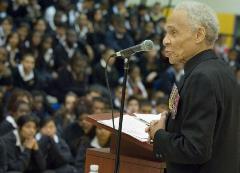
Stanley Grizzle, born November 18, 1918 in Toronto, was a labour activist who later became a citizenship judge and politician. He was instrumental in advancing the rights of Black Canadians through his activism and leadership with the Brotherhood of Sleeping Car Porters (“BSCP”) and his work in politics.
Mr. Grizzle became a sleeping car porter with the Canadian Pacific Railway (“CPR”) in 1940 after high school. At that time sleeping car porters were predominantly Black workers, and they suffered difficult and unfair working conditions. They were also subjected to racist behaviour and practices; it was commonplace for white passengers to call all porters “George”, after George Pullman who invented the Pullman sleeping car, rather than by their names.
In 1943, the sleeping car porters of the CPR joined the BSCP, a union organizing this sector of the railway industry across the United States and Canada. Mr. Grizzle became active in the union and was elected president of the Toronto CPR division of the BSCP in 1946.
Through collective agreement negotiations with CPR, the BSCP was able to achieve better working conditions for its members. Under its first collective agreement, the BSCP won the right to have name cards for porters in the sleeping cars to encourage passengers to call porters by their names. Later, the union fought for the right of Black workers to be promoted from porters to conductors.
Despite working toward the common goal of workers' rights, the BSCP faced racism from within the Canadian labour movement. The Canadian BSCP was initially denied membership in the General Conference Committee of railway unions, an organization of unions that at the time coordinated with each other in common bargaining with employers. It was not until 1952 that the BSCP was granted membership in the GCC.
Mr. Grizzle is also understood to have organized the initial event that grew into what is now Black History Month in Canada. In 1950, Mr. Grizzle hosted a week-long celebration of Black history in Toronto, which is believed to have been the first in Canada. The movement to establish Black History Month in Canada can be traced from there.
Mr. Grizzle was an important contributor to the labour movement beyond the BSCP as well and actively challenged racism on several fronts. He was a member of the Joint Labour Committee to Combat Racial Intolerance, a delegate to the Toronto Labour Council, a member of the Toronto Labour Committee for Human Rights and a founder of the Railway Porter’s Trade Union Council. He addressed federal Cabinet concerning Canada’s discriminatory immigration policies, and ran for provincial office as a candidate for the Co-operative Commonwealth Federation (CCF) party. Mr. Grizzle later became the first Black clerk of the Ontario Labour Relations Board, and was later appointed as a citizenship judge by Prime Minister P.E. Trudeau. He was the first Black citizenship judge in Canada. During the 1990s Mr. Grizzle was made a Member of both the Order of Ontario and Order of Canada.
For more on Mr. Grizzle’s life and work, see his memoir, My Name’s not George: The Story of the Brotherhood of Sleeping Car Porters (Toronto: Umbrella Press, 1998).
Special thanks to Lauren Sheffield for her assistance in preparing this feature.
About this feature: The Cavalluzzo LLP features series, Reflections: Labour, Human and Civil Rights, highlights some of the leaders, events, and milestones that are historical underpinnings to the current landscape of Canadian human rights and labour rights. Reflections may reference abhorrent historical realities: as we bear witness to those, we also recognize with gratitude the courage and commitment of the changemakers who continue to inspire strides in social justice. Each instalment in this series has been authored or contributed to by Cavalluzzo LLP staff, articling students or lawyers.